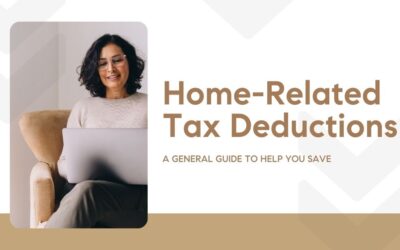I want to talk about a topic that’s on the mind of many homeowners this time of year — tax deductions. I know, taxes can be a bit of a snooze-fest, but trust me when I say that understanding the tax deductions available to you can be a game-changer for your financial bottom line. So, grab a cup of coffee, get comfy, and let’s dive in to learn about some of the most common tax deductions for homeowners. Whether you’re an experienced homeowner or a first-time buyer, this information can help you make the most of your investment.
Mortgage Interest Deduction
If you’re a homeowner in the United States, you may be eligible for the Mortgage Interest Deduction. This tax benefit allows you to deduct from your taxable income the interest you pay on your mortgage loan, potentially resulting in a lower tax bill. To qualify for this deduction, the homeowner must use the mortgage loan to buy, build, or improve their primary residence. However, it’s important to note that not all taxpayers will benefit from this deduction under the new tax laws. The loan amount and other factors limit the amount you can deduct each year. If you do qualify, you can claim the deduction on Schedule A of Form 1040. Additionally, you may be able to deduct mortgage points or prepaid interest, subject to certain requirements. To learn more, I recommend this resource.
Property Tax Deduction
For new homeowners, there’s a tax break that can really pay off – the property tax deduction. This deduction allows you to subtract some of the annual property taxes paid from your taxable income. It’s typically available to homeowners who have recently purchased a property and are paying property taxes for the first time. The best part? This deduction can result in a lower tax bill or a larger refund. But, be aware that this deduction is subject to certain limits and restrictions, so it’s important to consult with a tax professional to learn more about how to claim it.
It’s important to note that there’s now a limit of $10,000 per year for deductible state and local taxes, including property taxes. Keep in mind that certain items on the property tax bill that may appear to be taxes, such as fees for services or assessments for local benefits, may not be deductible. And, If your bank or lender pays your real property taxes through an escrow account, only the amount they actually pay to the tax authority is deductible, which you can find on Form 1098.
Home Office Deduction
Ah, the home office tax deduction. As a new homeowner, this could be music to your ears if you work from home. This deduction allows you to claim a portion of your home expenses, such as mortgage interest, property taxes, utilities, and related costs, as a tax-deductible business expense. However, there are some strict requirements. The space you use in your home must be exclusively and regularly used for business purposes, such as telecommuting or running a business from home. The simplified square footage calculation rate is $5 per square foot, with a maximum of 300 square feet. And to qualify the home office must be the principal location of the business or a place for regular customer or client meetings. Unfortunately, employees who work from home are not eligible for this deduction. But if you’re self-employed and meet the criteria you should be able to claim the deduction!
Capital Gains Exclusion
Here’s another one of the tax deductions for homeowners. The capital gains exclusion is another way to reduce your taxable income by excluding profits you make from selling your primary residence. If you’re single, you can exclude up to $250,000, and if you’re married and filing jointly, you can exclude up to $500,000. But, there’s a catch. You need to have owned and lived in the house for at least two of the past five years to qualify. If you meet this criteria, you won’t have to pay capital gains tax on the first $250,000 (or $500,000 if you’re married and filing jointly) of profit you make. And if you have more losses than gains, you can offset up to $3,000 of your other income with those losses, with any additional excess carried forward into future tax years. Go get those savings!
Energy-Efficient Home Improvements Deduction
The federal government recently passed the Inflation Reduction Act (IRA) of 2022 which offers two tax incentives to help you reduce your carbon footprint: the Energy Efficient Home Improvement Credit and the Residential Clean Energy Credit. The Energy Efficient Home Improvement Credit can net you up to $1,200 per year for certain energy-saving upgrades installed from 2023 to 2032. Plus, there’s a $3,200 credit for things like home energy audits, doors, windows, and heat pump systems. The Residential Clean Energy Credit is worth 30% of eligible expenses for residential clean energy technologies, such as solar panels, wind turbines, geothermal heat pumps, fuel cells, and battery storage systems. The credit will decrease from 30% to 26% in 2033 and 22% in 2034, and it will expire after 2034. These credits won’t give you cash back, but they act as a credit that can reduce your tax bill!
Points Paid Deduction
A points paid deduction is a way to save on taxes related to mortgage interest. When taking out a mortgage loan, home buyers can pay mortgage discount points, also known as prepaid interest, to get a lower interest rate. You can deduct these fees on your tax return, but you must meet specific requirements. The mortgage loan must be for your primary residence, the points paid must be a percentage of the loan, and the amount paid cannot be considered excessive. The benefit of paying points is a lower loan rate and a tax deduction, but you should carefully consider the upfront cost and IRS rules. As always, check with your tax accountant before buying mortgage points or claiming this deduction.
Conclusion
In conclusion, tax deductions specific to homeowners can be a great way to reduce your tax bill and keep more of your hard-earned money. From home office deductions to capital gains exclusions, there are a variety of ways to take advantage of tax incentives as a homeowner. And let’s not forget about the Energy Efficient Home Improvement Credit and Residential Clean Energy Credit, which not only help you save on energy costs but also reduce your tax liability. Just remember to follow the IRS rules and consult with a tax professional if you have any questions about homeowner tax deductions. Happy tax season, everyone!
If you have any questions or need a referral to a qualified tax attorney or accountant, please don’t hesitate to contact me for more information.
——
Disclaimer: Please note that while I strive to provide accurate and helpful information on tax deductions for homeowners, I am not a tax expert or a certified public accountant. The information I provide is intended to be a general overview of tax deductions and should not be considered as specific tax advice. Any decisions you make regarding your tax situation should be made after consulting with a qualified tax professional who can provide you with personalized advice based on your unique circumstances. I am not responsible for any errors or omissions in the information provided, and I disclaim any liability for any actions taken based on the information contained in this blog post.




